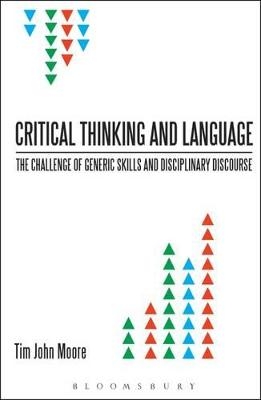
Critical Thinking and Language
The Challenge of Generic Skills and Disciplinary Discourses
Seiten
2011
Continuum Publishing Corporation (Verlag)
978-1-4411-5750-8 (ISBN)
Continuum Publishing Corporation (Verlag)
978-1-4411-5750-8 (ISBN)
Explores what it means to be 'critical' in different disciplines in higher education and how students can be taught to be effective critical thinkers. This book clarifies the idea of critical thinking by investigating the 'critical' practices of academics across a range of disciplines.
This book explores what it means to be 'critical' in different disciplines in higher education and how students can be taught to be effective critical thinkers. This book clarifies the idea of critical thinking by investigating the 'critical' practices of academics across a range of disciplines. Drawing on key theorists - Wittgenstein, Geertz, Williams, Halliday - and using a 'textographic' approach, the book explores how the concept of critical thinking is understood by academics and also how it is constructed discursively in the texts and practices they employ in their teaching. Critical thinking is one of the most widely discussed concepts in debates on university learning. For many, the idea of teaching students to be critical thinkers characterizes more than anything else the overriding purpose of 'higher education'. But whilst there is general agreement about its importance as an educational ideal, there is surprisingly little agreement about what the concept means exactly. Also at issue is how and what students need to be taught in order to be properly critical in their field. This searching monograph seeks answers to these important questions.
This book explores what it means to be 'critical' in different disciplines in higher education and how students can be taught to be effective critical thinkers. This book clarifies the idea of critical thinking by investigating the 'critical' practices of academics across a range of disciplines. Drawing on key theorists - Wittgenstein, Geertz, Williams, Halliday - and using a 'textographic' approach, the book explores how the concept of critical thinking is understood by academics and also how it is constructed discursively in the texts and practices they employ in their teaching. Critical thinking is one of the most widely discussed concepts in debates on university learning. For many, the idea of teaching students to be critical thinkers characterizes more than anything else the overriding purpose of 'higher education'. But whilst there is general agreement about its importance as an educational ideal, there is surprisingly little agreement about what the concept means exactly. Also at issue is how and what students need to be taught in order to be properly critical in their field. This searching monograph seeks answers to these important questions.
Tim John Moore is a Senior Lecturer at the Swinburne University of Technology, Australia and an Adjunct Research Associate at Monash University, Australia
1. Introduction: the problem of critical thinking; 2. Critical Thinking: history, definitions, issues; 3. In Search of Critical Thinking; 4. The Ineffability of Critical Thinking; 5. Critical Thinking: the disciplinary dimension; 6. Critical Thinking: so what is it?; 7. Conclusions & Implications for Teaching; Bibliography; Index.
| Erscheint lt. Verlag | 15.12.2011 |
|---|---|
| Verlagsort | New York |
| Sprache | englisch |
| Maße | 156 x 234 mm |
| Gewicht | 562 g |
| Themenwelt | Geisteswissenschaften ► Philosophie ► Logik |
| Geisteswissenschaften ► Psychologie ► Pädagogische Psychologie | |
| Geisteswissenschaften ► Sprach- / Literaturwissenschaft ► Sprachwissenschaft | |
| Sozialwissenschaften ► Pädagogik | |
| ISBN-10 | 1-4411-5750-6 / 1441157506 |
| ISBN-13 | 978-1-4411-5750-8 / 9781441157508 |
| Zustand | Neuware |
| Informationen gemäß Produktsicherheitsverordnung (GPSR) | |
| Haben Sie eine Frage zum Produkt? |
Mehr entdecken
aus dem Bereich
aus dem Bereich
ein Gegenentwurf zum kurzfristigen Denken : so werden wir zu den …
Buch | Hardcover (2023)
REDLINE (Verlag)
CHF 27,90
Buch | Softcover (2023)
De Gruyter (Verlag)
CHF 34,90


